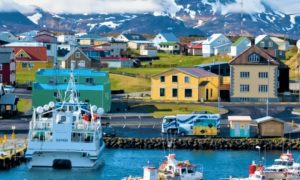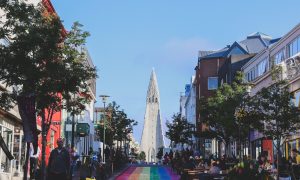Iceland, with its breathtaking natural beauty and high quality of life, is attracting more and moreimmigrantsThe Gaze. However, theImmigration to IcelandThe fees and cost of living are not low, and proper budget planning is the key to successful immigration. This article will provide you with a comprehensive analysis ofIcelandic immigrantsA detailed analysis of the costs of immigration, including necessary expenses during the immigration process and the cost of living, will help you to be well prepared.
One,Icelandic immigrantsMain costs
1. Visa and residence permit fees
Whichever way youImmigration to Iceland(work visa, family reunification orinvestment immigration), applying for a visa and residence permit is the first step.
- Visa Application Fee: The cost of a work visa or family reunification visa is approximately 150-250 euros, depending on the type of visa and the country of application.
- Residence Permit Fees: There is a processing fee of approximately 120 euros for the first application for a residence permit, and a similar fee for renewals.
2. Language Learning Costs
Although most Icelanders speak English, mastering Icelandic is an important part of integrating into the local community.
- Language Course Fees: The cost of an Icelandic language course is around 500-1000 euros, depending on the level of the course and the duration of study.
3. Occupational certification and assessment fees
Some professions (e.g. doctors, lawyers and teachers) require professional qualifications in Iceland, which may incur additional costs.
- Accreditation Fee: Usually between 200-500 euros, possibly more in some areas.
4. Immigration consultant or agent fees
If you choose to hire an immigration consultant, a consulting or representation fee is required.
- service cost: Depending on the content of the service, the cost ranges from 500 euros to several thousand euros.
II. Main costs of living after migration
Immigration to IcelandAfterwards, you will be faced with various expenses of daily life, including housing, food, transportation and other costs. Below is a detailed analysis of the major costs of living:
1. Housing costs
Housing is the largest expense component of the cost of living in Iceland, especially in the capital city of Reykjavík.
- Rental costs: The monthly rent for a one-bedroom apartment is around 1,500-2,000 euros, and may be higher in the city center area.
- Purchase of real estate: House prices in the Capital Region are around 4,000-6,000 euros per square meter, depending on the location and condition of the house.
- additional surcharge: Rentals usually do not include utilities, heating and property management, which cost around 150-300 euros per month.
2. Expenditures on food and daily necessities
The high prices of food and daily necessities in Iceland are due to the dependence on imports for many goods.
- everyday food: Purchasing basic foodstuffs (e.g. bread, milk and meat) in supermarkets costs about 300-500 euros per month.
- dine out: Restaurant meals are more expensive, with an average lunch costing around 15-20 euros and a dinner in an upscale restaurant possibly exceeding 50 euros.
3. Transportation costs
Iceland's public transportation system is concentrated in the capital area and has a high rate of vehicle ownership.
- mass transit: A monthly pass costs about 50-70 euros.
- Private car use: The cost of purchasing an average car is between 10,000 and 20,000 euros, plus fuel and insurance, which costs about 200-300 euros per month.
4. Medical and insurance costs
The health care system in Iceland is highly developed, but immigrants are required to pay fees.

- medical insurance: All residents are required to pay for health insurance, which costs about 50-100 euros per month.
- Additional medical expenses: Partial payment may be required for visits to the doctor or the purchase of medicines, e.g. the cost of an outpatient visit is approximately 20 euros.
5. Education costs
Public schools in Iceland are free of charge, but some international schools and training programs require additional tuition fees.
- International School Tuition: Approximately 4,000-10,000 euros per year.
- Childcare fees: Kindergarten fees are approximately 200-400 euros per month.
6. Recreational and cultural activities
Iceland is known for its wealth of cultural activities and nature experiences, but some of these require an extra budget.

- cinema ticket: Approximately 15 euros each.
- Spa and attraction tickets: Admission prices to the Blue Lagoon Spa start at €50 and can be more expensive during peak hours.
III. Recommendations for budgetary planning for migration
1. early savings
Based on the above analysis, the initial budget for immigrating to Iceland (including visa, airfare and initial living expenses) is at least 10,000-15,000 euros. It is advisable to save in advance and ensure that you have some emergency funds.
2. Finding more cost-effective options
- shelter: Consider residential areas on the outskirts of downtown where rents will be lower.
- shopper: Purchase food and daily necessities at local supermarket chains (such as Bonus and Kronan) for more affordable prices.
- transportation: Reduce the cost of private car use by choosing public transportation or carpooling.
3. Apply for Welfare Support
After immigrating to Iceland, eligible residents can apply for some of the welfare support provided by the government, such as housing subsidies and child allowances.
IV. Summary
Icelandic Immigration FeesAlthough higher, costs can be effectively reduced through proper planning and optimization of expenditures. A comprehensive understanding of all costs associated with immigration and a detailed budget plan are required before immigration.
Immigrating to Iceland is not only a financial challenge, but also a lifestyle upgrade. Adequate financial preparation will help you to better adapt to the high quality of life in Iceland and to truly enjoy the unique charms that this country has to offer.






